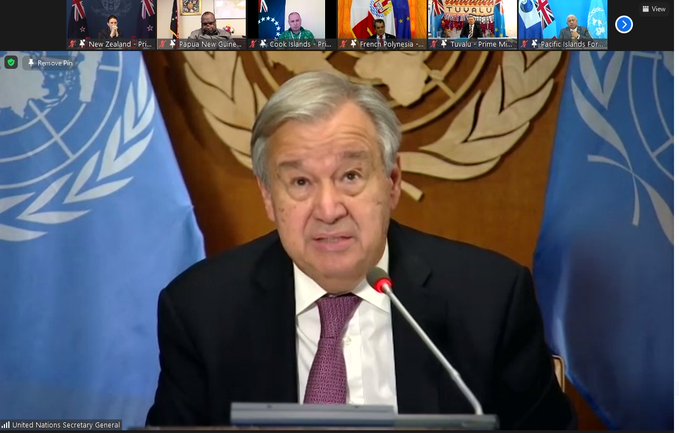The Secretary General of the United Nations has told Pacific nations that a 45 percent cut in emissions by 2030 was needed globally to reach carbon neutrality by 2050, adding that continuing on the current trajectory “puts us on a catastrophic pathway”.
António Guterres was speaking at a virtual meeting with Pacific Island Forum leaders as part of the UN General Assembly(UNGA) taking place in New York.
“Your nations are confronting a dual crisis of climate change and the Covid‑19 pandemic. Both threaten Pacific lives and livelihoods,” he told leaders of Pacific Island nations, which face existential threats due to sea level rise, extreme weather events and other impacts of global heating.
“If we follow the current path, the consequences of climate disruption for the prosperity, wellbeing and the very survival of Pacific communities will be severe.”
Guterres called for “more ambition from every country”, saying that “nationally determined contributions that currently exist would result in an increase of 16 percent in emissions by 2030, and that puts us on a catastrophic pathway of 2.7 degrees of global heating. This must stop. This must be reversed.”
Leaders of Pacific countries have been urging developed countries, including Australia, to set new and more ambitious emissions targets ahead of the COP26 meeting to be held in Glasgow in November.
Fiji’s prime minister has been calling for countries to come to the summit with a commitment to getting to net zero emissions sooner than 2050.
“The science is in and the alarm is rung – the world is not doing enough to cut emissions,” tweeted Voreqe Bainimarama, the prime minister of Fiji, as the general assembly opened this week.
Bainimarama added that the general assembly set the stage for a successful COP summit. “Let’s be clear what success means for those most vulnerable: commitments to net-zero global emissions sooner than 2050, zero excuses.”
In an address to the general assembly this week, the president of Palau, Surangel Whipps Jr, urged the global community “to take the same level of urgency and bold action” it did to tackle Covid-19 “in responding to the existential threat of climate change”.
Whipps pointed to the destruction caused by Typhoon Surigae in April, the third typhoon to hit Palau since 2012, despite the country historically lying outside the Pacific typhoon belt.
Whipps said Surigae damaged 20 percent of homes in the country, destroyed millions of dollars in crops and wreaked havoc on reefs and corals, undermining the nations’s food security.
“The gradual destruction of climate change has allowed us to be complacent and to respond by kicking the can down the road,” he said.
“However, ladies and gentlemen, the IPCC report has indicated that we are running out of time. Simply put, we must act now to ensure our children inherit a healthy and reliable future. We need to act now before further irreparable damage is made to our planet.”
Guterres also called for more money to be made available for developing nations for adaptation measures, calling on developed countries to deliver on their longstanding promise to mobilise $100bn a year for climate change action in developing countries.
This came after the US president told the general assembly he would ask the U.S Congress to double to US$11bn a year by 2024 the financial assistance the U.S offers to developing countries to help them cut greenhouse gas emissions and cope with the impacts of extreme weather.
SOURCE: THE GUARDIAN/PACNEWS














